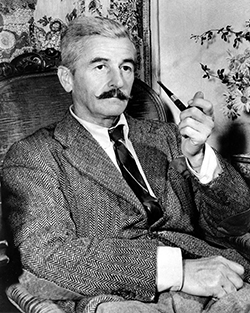
William Cuthbert Faulkner - Significant writer of southern U.S. literature
September 25 is the birthday of William Cuthbert Faulkner, the famous American writer who became the idol of entire generations. He is the master of the new American prose of the 20th century, which became famous in Europe in the twenties, and in the thirties received worldwide recognition.
During his 64 years of life, he became the author of nearly two dozen novels, seven collections of short prose, as well as a classic of world literature and winner of the Nobel and Pulitzer Prizes.
The future writer was the eldest of four sons of Marry Charles Faulkner and Maude Faulkner, a university administrator. There was a legend in the family about William's great-grandfather, after whom the boy was named. That as a young man left home, at age 14 was already working in prison, then participated in the Mexican War, was a planter, led a cavalry regiment in the war of North and South, and in his later years wrote the novel "The White Rose of Memphis," which was a big success with the South.
Before school William, taught to read his mother, and at age 13 he had already written poems dedicated to Estelle Oldham, a girl with whom he was in love. Faulkner did not finish school and worked for some time in the bank for his grandfather.
William could not marry Estelle because of dim financial prospects, and when the girl married another in April 1918. Faulkner wanted to volunteer for the army, but was rejected because of his short stature. At that time he is closely engaged in poetry.
In 1924 appears his first poetry collection "Marble Faun", which had almost no positive reviews. Faulkner was more successful in these years in the visual arts.
A writer acquaintance advised him to start writing prose. So American literature was enriched by another talent.
His debut major work, the novel “Soldier's Pay”, was expectedly forgotten by critics and readers. It was followed by “Mosquitoes” (1927), a satirical portrayal of New Orleans bohemia. Although neither the first nor the second novel attracted the attention of readers, Faulkner did not despair and wrote “Sartoris” (1929), two more works, but, three years after the first prose publication, his name was still taken seriously by literature. In 1929 the novel “The Sound and the Fury”, one of the most important works of the writer, appears in bookstores.
This novel made him famous, although only the critics reviewed it favorably, and ordinary readers had a hard time accepting Faulkner's innovative methods of prose. All the following books, too, were not written for the average prose fan, so the writer was often in a financial hole.
Faulkner wrote his next novel, “On His Deathbed” (1930), in six weeks while working the night shift at a power plant. This book, consisting of fifty-nine internal monologues, recounts the journey of a poor Southern family of Bandrens as they carry Mrs. Bandren's body to Jefferson Cemetery. Although American author Conrad Aiken called the novel "top-notch," On His Deathbed sold as poorly as the writer's previous books.
Faulkner, faced with the need to support his family, decides to write, in his own words, "a story more horrible than you can think of," and three weeks later “The Sanctuary” (1931) appeared, the story of a young woman who was raped by a gangster and then, ironically, found refuge in a brothel in Memphis. The novel immediately became a bestseller. Despite its sensationalist nature, it impressed many critics, including André Malraux, who declared that The Sanctuary was "a Greek tragedy with a detective plot."
The novel's success only temporarily solved the writer's financial problems, as demand for books plummeted during the Great Depression; in addition, Faulkner's novels offered readers no distraction from the turmoil of life. In search of more lucrative work, the writer made his first trip to Hollywood in anticipation of a film adaptation of one of his stories. Over the years Faulkner wrote the screenplays of many popular films.
At the same time Faulkner creates such works as "Pylon" (1934), "Absalom, Absalom!" (1936), "The Wild Palms" (1939), "The Village" (1940), as well as "Go down, Moses" and other stories "(1942), which included the story" The Bear ", one of the best in world literature. Many of Faulkner's books have been translated into French and elicited enthusiastic responses from a number of European writers and critics. Jean Paul Sartre, for example, wrote, "Faulkner is a god!"
In 1950. William Faulkner was awarded the Nobel Prize "for his significant and from an artistic point of view, a unique contribution to the modern American novel. The awarding of the Nobel Prize was controversial. Many accused the writer of excessive fascination with themes of racial hatred and violence in the American South.
In 1955 William Faulkner won the Pulitzer Prize for his novel Parable, and in 1962 he published the novel The Snatchers, which also won the Joseph Pulitzer Prize in 1963, but the award was given posthumously. Critics called Faulkner's last novel his greatest work. It again depicted life in the U.S. South, this time through the eyes of an aristocratic boy. It is he who sees life changing around him, the passing of the old days and the advent of jazz, horse racing and expensive cars.
Faulkner's literary fame continues to grow steadily even after his death. In the words of one critic, "Working alone in the vast cultural desert of Mississippi, Faulkner managed to create an oasis for his mind and a garden for his creativity-a garden which the writer cultivated with such love that even today it continues to feed the imagination of educated people throughout the civilized world.
Polnikov Alexey librarian of the Department of the International Book

